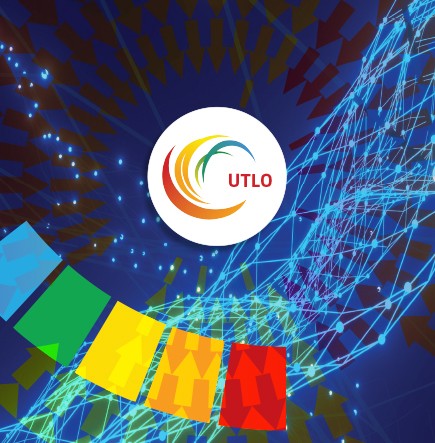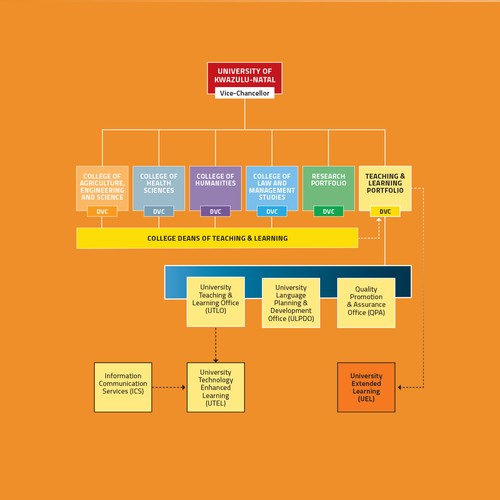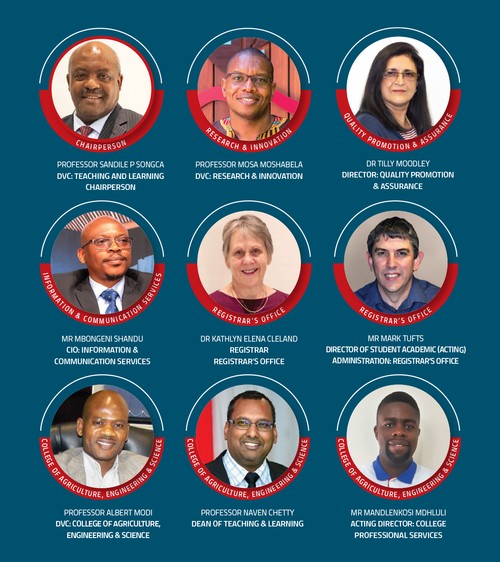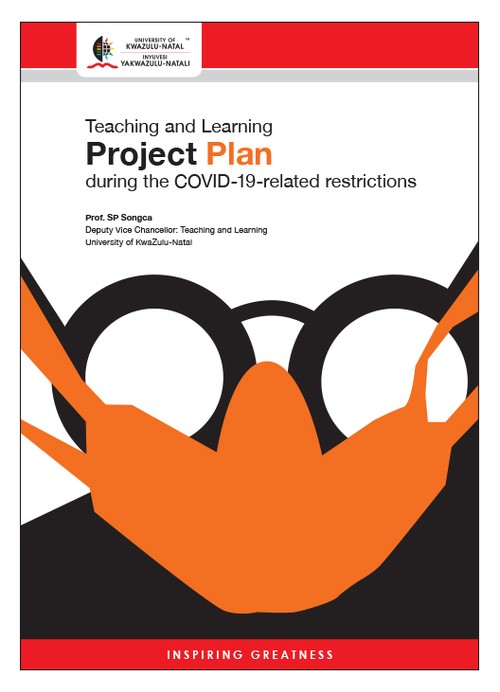The College of Law and Management Studies (CLMS) has devoted much effort to supporting students in line with University policies and a social justice framework. Several initiatives have been put in place to this end, most of which are supported by the University Capacity Development Grant, although some are supported by other sources such as the INSETA mentorship projects. Our initiatives have evolved over the years in response to students’ needs and the evidence emanating from our evaluation of them. Therefore, apart from showcasing our initiatives, we also provide evidence of how they have improved students’ academic performance. We acknowledge that apart from academic monitoring and support (AMS) interventions, other factors (both observable and non-observable) may have contributed to these results. Thus, where possible, the statistics we present are controlled for some of these observable factors.
In addition to AMS interventions, we also showcase evidence of academic excellence (both students and academics), curriculum transformation, community engagement initiatives, and research and other initiatives that our College has embarked on.
Academic Monitoring and Support
Academic Monitoring and Support (AMS) is one of the key teaching and learning activities in the CLMS. The College’s AMS initiatives include:
- Academic advising,
- Supplemental tutorials,
- The first-year experience programme, and
- Academic writing support.
- Academic Advising and Supplemental Tutorials
This section of the report highlights the activities and initiatives undertaken by the ADOs and Supplemental Instruction Leaders (SILs) in providing academic support to CLMS students in 2021. These activities included conducting SI sessions, facilitating tutorial and practical sessions, providing individual and group consultations, test and exam revision sessions, and responding to email and WhatsApp queries. In addition, we outline the strengths and opportunities (advantages) of transitioning to remote online learning as well as challenges and limitations (disadvantages) from both a student and teaching perspective. The report concludes with evidence of the performance of students attending SI support sessions.
Due to the COVID-19 restrictions, the flipped learning process permeated AMS activities, which moved to online platforms such as WhatsApp, Moodle and Zoom video conferencing. As can be expected, there were a number of challenges as well as opportunities. These include:
Positive outcomes
Most students who attended AMS initiatives were comfortable engaging online, and in particular appreciated the convenience.
Recording sessions and posting them on Learn (Moodle) allowed students access at convenient times. These recordings were accessed by a larger group of students than those who attended timetabled programs such as SI, and tutorial and practical sessions.
Online learning introduced students to new platforms to complete practicals and projects. For example, prior to online learning, students used applications such as MS Project, but in 2021 they were exposed to Click-up, an application available online for their projects.
Online platforms, in particular Zoom, sometimes enabled easier teaching and demonstration of how new applications work.
Some SI sessions could be conducted on Saturdays and sometimes on Sundays, as well as in the evening due to the convenience of online communication.
Negative outcomes
Online learning led to a drop-in attendance.
Some students reported connectivity, load shedding or data problems. This resulted in a preference for recorded videos over live sessions.
A limitation of viewing recorded sessions is that students have minimal opportunities to raise queries to facilitate their grasp of dense academic content.
Inadequate or delayed timetabling of online lecture, tutorial, practical and SI sessions.
Specific topics in some modules do not lend themselves to online learning and require practical on-site (campus) support.
Some of these issues are beyond the control of the AMS team. However, where possible students were assisted to complete motivations to return to campus, while the ADOs were available on WhatsApp chat to assist students who needed to ask questions after class.
Data management for at-risk students
In total, the ADOs saw 1 883 students in individual or group consultations. These students’ progression is depicted in Table 10 below. It shows that 811 were at risk and by the end of the consultation period 165 had made good progress and reverted to good academic standing, while 498 remained at risk, 126 moved to risk 2, and 22 moved to probation status. Of the students who were on probation at the beginning of the consultation period, 31 continued on probation, while 19 met their probation requirements and four were excluded).

Table 10: Data Management – ADO and SI Leaders
In addition to individual or group consultations, ADOs also supported students in 31 modules across the three Schools. These modules are considered high risk because they either have large numbers or low historical performance. On average, students who attended SI tutorials had better academic outcomes than those who did not. We also measured the effectiveness of the SI tutorials on course performance and used the Hedges’ g to compute effect sizes. Overall, the effect of the SI tutorial intervention on course performance is 0.43, suggesting a moderate effect. The effect ranges from 1.04 for MGT101 to 0.006 for FINA312. Only one module, ACCT103 had a negative effect size.

Figure 25: Effectiveness of the SI Tutorials On Course Performance Using the Hedges’ G to Compute Effect Sizes
Development of isiZulu Videos
A team of ADOs and tutors (Ms Nolwazi Biyela and Mr Decleck Magubane) in the SAEF developed conceptual videos in isiZulu (CViZ). Each is a few minutes long and focuses on a ‘threshold concept’ or technique in economics. Their work was presented at the 4th Biennial Language Research Symposium 2021 as well as the 8 AMS Colloquium.
The Writing Place
The Writing Place (WP) is responsible for providing academic literacy support to all students in the College. Tutors conduct online consultations with students where comprehensive feedback is provided on students’ written assignments in terms of aspects such as structure, paragraphing, the flow of the argument, academic expression and referencing. Writing Place tutors also facilitate academic writing workshops at undergraduate and postgraduate levels on a range of topics related to developing reading, writing and literacy skills. In 2021, WP tutors assisted 1 536 students. This was less than previous years when the total number of consultations was ± 2 000 and was mainly due to the disruptions caused by the COVID-19 pandemic and, speculatively, the change in assessment practices.
Of the 1 536 students who consulted, 1 353 (88%) were undergraduate and 183 (12%) postgraduate students (Honours level and above).
Although, as depicted in Figure 26, most of the students who consulted were in good academic standing as per the UKZN progression rules, these figures are in line with the proportion of students with negative term decisions within the College. Nonetheless, there is a need to encourage more at-risk students to use AMS interventions.

Figure 26: Risk Status of Consulting Students
The evidence on the effectiveness of the academic writing consultations is also promising and shows that students who consult have better marks than those who do not. Using a treatment effects model with a regression adjustment method (Table 11), the results show that in general, students who consulted at the WP were most likely to receive higher marks. For instance, in 2018, on average, consulting students received seven (7) more marks than those who did not consult.

Table 11: Effectiveness of Academic Writing Consultations
The First-Year Experience (FYE) Programme
The FYE (peer academic mentorship) programme mainly focuses on monitoring and offering academic support to first-year students to improve their academic experience at the University. There are two different approaches to our mentoring, namely, weekly monitoring of mentees and supporting mentees with the necessary skills in various ways, i.e., skills development and content support. The key academic support tools used in the FYE programme include:
- Assigning mentees to mentors.
- Developing a success plan – a student-driven plan to help mentees set goals and stay on track to achieve them.
- The weekly timetable.
- WhatsApp groups – offering support to mentees after hours.
- FYE Seminars – which are held in collaboration with SSS covering topics such as i) adjusting to University, time management, note-taking, and note-making, ‘Staying Green’ covering topics such as working in groups, the robot system, exam and test preparation and stress management.The FYE Moodle Site – to share materials and content covered during the FYE skills development sessions. The platform was also used to make urgent announcements to all FYE mentees (participants) and the entire FYE team. Students can also post questions if they are confused about specific issues.
Student Support Services is an integral component of the CLMS FYE programme. The SSS Unit has developed a ten-day training programme for mentors to equip them with the skills needed to support first-year students. In addition, SSS meets with the mentors on a bimonthly basis to offer ongoing support.
Some statistics
Of the 902 first-year students registered in the CLMS, 694 signed up for the FYE programme and were allocated a mentor. These students also participated in the WhatsApp groups, with 286 (41.2%) attending at least one to four group sessions (seminars) while 408 (58.8%) attended more than five seminars over the year.
Mentee Evaluation of the FYE Programme
This survey was conducted with FYE participants to solicit feedback on sessions, mentors and all activities in the programme. Overall, the responses from 102 students show mentee satisfaction with the programme, particularly the mentorship programme.

Table 12: Participation in the FYE WhatsApp Groups
INSETA/SAEF MENTORSHIP PROGRAMME
The SAEF launched the Insurance Sector Education and Training Authority (INSETA) mentorship programme in 2020 with the objective of supporting all students towards completing their degrees. The programme which is led by Dr Michelle Hatch initially only focussed on at-risk students, particularly M+1 and M+2 students.

Dr Michelle Hatch
Over the past two years, there was increased demand for the programme which resulted in it being extended to all students on a voluntary basis. It currently focuses on students completing qualifications within the SAEF. Since 2020 an average of 222 students have been mentored each semester, with 2022 showing the highest level of engagement to date with approximately 276 mentees actively participating in the programme. Each mentee has a one-on-one meeting with their mentor every second week and they discuss any challenges the mentee might be experiencing. The role of the mentor is to motivate and support their mentee and where necessary refer the mentee to the appropriate UKZN student support service. Mentees are also required to attend a weekly group session led by their mentor and the project assistant (PA). Topics covered in the group sessions have included time management, study skills, ‘What to do after your degree?’ and CV writing. Feedback from mentees in 2022 indicates that they benefited from the programme:
“The mentoring programme has really been helpful for me as being more of a programme that is so dedicated to improving one’s self-esteem, the importance of self-understanding and knowledge, … being more organised, disciplined and understanding that every day is always a new day to improve and become a better version of one’s self. I have been … fortunate enough to attain all the above.”
“What I liked the most was the safe space to talk, having someone to talk to about anything, and the advice I got from my mentor was what I needed and effective.”
“Everything was good and our mentors are so professional and treat us with due care and diligently.”
“Each week we discuss a topic that is relevant and they always give us great advice on how to handle various situations which is really helpful.”
Going forward, we aim to continuously increase awareness of and promote this programme to ensure it reaches all our students. We are also very focussed on continuing to work closely with existing UKZN support services to ensure our students are able to access the help and guidance that they require.
Curriculum Transformation
In order to align the Postgraduate Diploma in Finance Programme with industry requirements, the SAEF updated the content in two modules to reflect the changes amidst the 4IR. This was influenced by the need to ensure that PGDip FBIM graduates are employable and well-versed in the relevant content. An external review was conducted of the programme’s curriculum and structure, led by a panel of industry professionals from major South African banks and investment companies. The development of these two modules is expected to increase the programme’s popularity.
Academic Excellence
UKZN Academic Develops Conceptual Framework for Online Learning
The COVID-19 pandemic brought about many challenges but also opportunities for development. This is exemplified by Dr Upasana Singh, an academic in the School of Management Information Technology and Governance who developed a conceptual framework, ASSET© (Academic SkillSET) for online teaching, learning and assessment.

Dr Upasana Singh
The ASSET© was developed from her research on the impact of the pandemic on teaching and learning and was piloted with more than 500 academics in 18 countries. This framework will assist academics as they navigate the online teaching and learning space.

Figure 27: ASSET© Conceptual Framework
UKZN-SAICA Academic Excellence Recipients
In 2020 and 2021, 47 and 35 top achieving students in the SAEF were recognised for academic excellence, respectively. These awards were presented at the annual UKZN-SAICA students’ awards ceremony and are a testament to the School’s concerted efforts to provide an environment where students thrive.
Excellence in Interdisciplinary Teaching and Learning
Dr Janine Hicks, an academic in the School of Law, was honoured for her contribution to excellence in teaching and learning support by the Culture cluster in the College of Humanities. This was in recognition of her work which ensures that candid debates on gender-based violence take place within the classroom.

Dr Janine Hicks
Workshops
The CLMS Teaching and Learning Unit engaged in a number of workshops in 2021. The Writing Place conducted eight workshops in Semester 2 of 2020 and 25 in 2021. Twenty-eight of these were undergraduate and five were postgraduate writing workshops. Some workshops were facilitated in conjunction with the ADOs who presented the content required for a specific assignment, while others focused exclusively on academic writing and referencing. The ADOs in the School of Management Information Technology and Governance collaborated with the Student Support team to host an online workshop on time management and study strategies during the lockdown. This was a much-needed initiative given that the COVID-9 pandemic has placed students more in control of their own learning, often in environments with many distractions.

SMIG ADOs and staff from CLMS College Support services
The School of Law held a series of Zoom seminars on anti-plagiarism and anti-cheating. These were made available to all years of study. The Zoom recordings are also available to all students (undergraduate and postgraduate) and were shared with other Schools in the College. A version of the seminars with sign language overlay is also available. The School also held meetings with class representatives and drafted guidelines to regulate the relationship between them and students.
Community Engagement
Free Grade 10 Maths Study Aid Material
CLMS Dean of Teaching and Learning, Professor Msizi Mkhize and his son, Mr Siphesihle Mkhize, a graduate of the Colleges of Law and Management Studies and Humanities, have been offering free Grade 10 mathematics study guide material since the beginning of the COVID-19 pandemic in 2020. These materials offer simplified step-by-step methods to solve some of the problematic mathematics concepts and are helpful to both teachers and learners. The material is available on their personal Facebook pages as well as at https://clms.ukzn.ac.za/.

Professor Msizi Mkhize
Publications
Msizi M.V. (2021). Pre-service teachers’ confidence and motivation in doing mathematics. Perspectives in Education. 39(4), 135-155. https://doi.org/10.18820/2519593X/pie.v39.i4.10
Msizi M.V. (2020). Pre-service teachers’ perceptions of their parents’ and teachers’ attitude to mathematics. Transdisciplinary Research in Southern Africa, 16(1),1-14. https://doi.org/10.4102/td.v16i1.802
Bengesai, A.V., and Pocock, J. (2021). Patterns of persistence among engineering students at a South African university: A decision tree analysis. S Afr J Sci., 117(3/4), Art. #7712. https:// doi.org/10.17159/sajs.2021/7712
Paideya, V., and Bengesai AV. (2021). Predicting patterns of persistence at a South African University: a decision tree approach. International Journal of Educational Management. DOI 10.1108/IJEM-04-2020-0184
Singh, U. (2021). The transformation in Higher Education in Australia during the COVID-19 pandemic. Pandemic & Remote Teaching in Higher Education. CINEP, Portugal.
Singh, U. (2021). The Educational Impact of Adopting Electronic Notes Pre Covid-19. Asian Journal of Science and Applied Technology ISSN: 2249-0698, 10(1), 32-40
Nyawo, J.C. and Mashau, P. (2021). The use of an online learning platform: A step towards e-learning. South African. Journal of Higher Education, 35(2), 123-143
Nyawo, J.C. (2021) A Comparison of Undergraduate Students’ Perception of Tutorials Before and During the COVID-19: A Case of the University of KwaZulu-Natal in the Discipline of Public Governance. International Journal of Higher Education, 10(2), 217-228
















